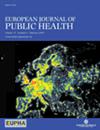德国学生心理健康素养:校本干预的评价
IF 3.7
3区 医学
Q1 PUBLIC, ENVIRONMENTAL & OCCUPATIONAL HEALTH
引用次数: 0
摘要
低心理健康素养,包括一系列与识别、管理和预防精神障碍相关的技能,已被确定为低心理健康求助率的关键原因,特别是在年轻人中。因此,加强青年心理健康素养的战略是通过提供普遍的学校干预措施。为了增加这种干预措施有效性的证据基础,已将一项现有方案("心理健康和高中课程指南")翻译成德语,并在学校实施。方法采用非随机前测后测对照组设计,验证项目实施后心理健康知识、污名化态度、求助效果(心理健康素养的中心指标)是否有所改善。在学校进行了笔和纸的调查,从参与的学生那里收集数据。干预组和对照组分别采用配对样本t检验进行统计分析。结果干预组为9个班169名学生(Ø 15.7岁),对照组为5个班82名学生(Ø 15.3岁)。参与项目后,干预组在心理健康知识、污名化态度和求助效果方面均有统计学上的显著改善。结论心理健康素养资源可以在德国学校环境中成功适配和使用,并能够改善心理健康素养的相关指标。需要收集更多的数据,以便及时了解结果的稳定性,并验证有效性是否随学校环境或参与青年的社会人口特征而变化。此外,可将干预措施作为一项公共精神卫生战略在全国范围内全面推广。本文章由计算机程序翻译,如有差异,请以英文原文为准。
Mental health literacy of students: evaluation of school-based intervention in Germany
Abstract Background Low mental health literacy, which encompasses a set of skills related to recognizing, managing, and preventing mental disorders, has been identified as a crucial cause for low rates of mental health help-seeking, especially among young people. Thus, a strategy for strengthening the mental health literacy of youth is through provision of universal school interventions. In order to add to the evidence-base of the effectiveness of such interventions, an already existing program (“Mental Health and High School Curriculum Guide”) was translated into German and carried out in schools. Methods A non-randomized pretest-posttest control group design was chosen to verify whether mental health knowledge, stigmatizing attitudes, help-seeking efficacy (as central indicators for mental health literacy) improved after the implementation of the program. A pen and paper survey was conducted in schools to gather data from participating students. Statistical analysis was conducted through paired sample t-tests for the intervention and control group individually. Results Nine classes with 169 students (Ø 15.7 years old) participated as intervention group, while five classes with 82 students (Ø 15.3 years old) served as a control group. Statistically significant improvements were observed after participating in the program for mental health knowledge, stigmatizing attitudes and help-seeking efficacy in the intervention group. Conclusions This study shows that a mental health literacy resource could be successfully adapted and used in the German school context and was able to improve relevant indicators of mental health literacy. More data needs to be collected in order to inform on the stability of the results in time and to verify whether effectiveness varies with characteristics related to school environment or socio-demographics of participating youth. Further, comprehensive nationwide roll-outs of the intervention can be implemented as a public mental health strategy.
求助全文
通过发布文献求助,成功后即可免费获取论文全文。
去求助
来源期刊

European Journal of Public Health
医学-公共卫生、环境卫生与职业卫生
CiteScore
5.60
自引率
2.30%
发文量
2039
审稿时长
3-8 weeks
期刊介绍:
The European Journal of Public Health (EJPH) is a multidisciplinary journal aimed at attracting contributions from epidemiology, health services research, health economics, social sciences, management sciences, ethics and law, environmental health sciences, and other disciplines of relevance to public health. The journal provides a forum for discussion and debate of current international public health issues, with a focus on the European Region. Bi-monthly issues contain peer-reviewed original articles, editorials, commentaries, book reviews, news, letters to the editor, announcements of events, and various other features.
 求助内容:
求助内容: 应助结果提醒方式:
应助结果提醒方式:


